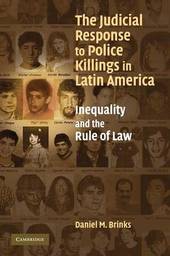
|
The Judicial Response to Police Killings in Latin America: Inequality and the Rule of Law
Paperback / softback
Main Details
| Title |
The Judicial Response to Police Killings in Latin America: Inequality and the Rule of Law
|
| Authors and Contributors |
By (author) Daniel M. Brinks
|
| Physical Properties |
| Format:Paperback / softback | | Pages:302 | | Dimensions(mm): Height 229,Width 152 |
|
| ISBN/Barcode |
9781107405097
|
| Classifications | Dewey:344.805232 |
|---|
| Audience | | Professional & Vocational | |
|---|
| Illustrations |
Worked examples or Exercises
|
|
Publishing Details |
| Publisher |
Cambridge University Press
|
| Imprint |
Cambridge University Press
|
| Publication Date |
19 July 2012 |
| Publication Country |
United Kingdom
|
Description
This book documents the corrosive effect of social exclusion on democracy and the rule of law. It shows how marginalization prevents citizens from effectively engaging even the best legal systems, how politics creeps into prosecutorial and judicial decision making, and how institutional change is often nullified by enduring contextual factors. It also shows how some institutional arrangements can overcome these impediments. The argument is based on extensive field work and original data on the investigation and prosecution of more than 500 police homicides in five legal systems in Argentina, Brazil, and Uruguay. It includes both qualitative analyses of individual violations and prosecutions and quantitative analyses of broad patterns within and across jurisdictions. The book offers a structured comparison of police, prosecutorial, and judicial institutions in each location, and shows that analyses of any one of these organizations in isolation misses many of the essential dynamics that underlie an effective system of justice.
Reviews'Daniel M. Brinks's The Judicial Response to Police Killings in Latin America represents an important contribution to the growing literature on the rule of law in nascent democracies. ... Brinks's skillful use of in-depth case studies is impressive. ... Brinks argues convincingly that any legal system is a reflection of deeply rooted social hierarchies. ... Brinks's innovative use of the notion of 'legal tolls' is particularly compelling. ... Brinks's book is a welcome contribution to our understanding of the impact of social marginalisation on the rule of law. ... The book's scope makes it a valuable addition to the scholarship on the rule of law not only in Latin American but across the developing world.' The Review of Politics ' ... an innovative study that draws on both socio-legal studies and comparative politics and combines quantitative and qualitative analysis. It represents a highly significant contribution to the growing body of literature on democracy and the rule of law in Latin America.' Journal of Latin American Studies
|